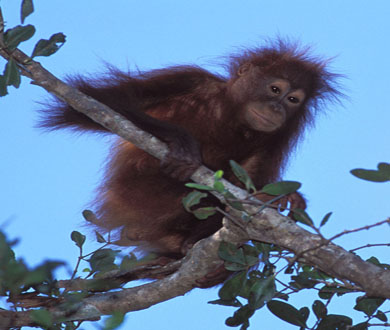Great Ape Conservation Fund 2011 |
|
| Total Number of Grants Awarded | 51 |
| Total Funds Distributed Through Grants | $3,869,265 |
| Total Partner Contributions Leveraged by Grants | $4,538,640 |
| Total Number of Countries that Received Program Support | 18 |
Apes, by their very nature, are extremely vulnerable. They live in small groups, grow relatively slowly, don’t produce many offspring, and have complex social relationships. Today, these highly intelligent, charismatic species are threatened by hunting for bushmeat, disease, the pet trade, and destruction of their forest habitats in Africa and Asia. All of the world’s ape species are at risk of extinction.
In 2000, the U.S. Congress passed the Great Ape Conservation Act and since then Wildlife Without Borders has been building the capacity of governments and private organizations to addressthe threats to great apes through the Great Ape Conservation Fund. The U.S. Fish and Wildlife Service is supporting efforts to fight poaching and illegal trafficking in great apes; to increase habitat protection by creating national parks and protected areas; and engaging the community through local initiatives to conserve the most threatened great ape species.
In 2011, with a Congressional appropriation of $2.2 million and additional funding through the USAID/CARPE program, the Fund awarded 51 grants totaling $3,869,265, which was matched by an additional $4,538,640 from partner organizations. These projects included:

Credit: HUTAN/KOCP
Africa
- Central Africa: Helping wildlife authorities and a local non-governmental organization to investigate and prosecute those responsible for wildlife crimes. In Cameroon, prosecutions have risen to nearly one per week, with 87% of offenders serving prison time.
- Democratic Republic of the Congo: Creating a Fallen Rangers Fund to support the families of park rangers who have given their lives to protect highly endangered mountain gorillas and other species. More than 150 park rangers have been killed in the past 15 years in clashes with rebel forces operating inside the park.
- Cameroon / Nigeria: Conserving Africa’s most endangered ape, the Cross River gorilla, by assisting local communities to conserve the the populations that occur outside of protected areas through a "Gorilla Guardian" program.
Asia
- Indonesia: Protecting the orangutan population on the island of Sumatra by increasing law enforcement to combat poaching poaching and mitigating human-orangutan conflict.
- Vietnam: Fighting the illegal trade in yellow-cheeked crested gibbons and other endangered species. Monitoring the cao vit gibbon, one of the world’s rarest primates, and reviewing planning for protected areas in Vietnam and southern China.
- Laos: Equipping substations near high-risk areas to monitor northern white-cheeked gibbons.

